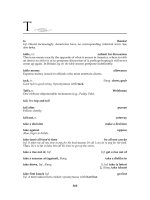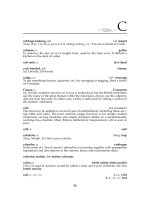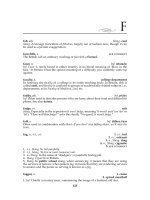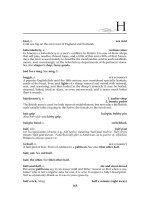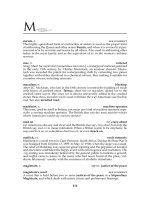British English A to Z - past 5
Bạn đang xem bản rút gọn của tài liệu. Xem và tải ngay bản đầy đủ của tài liệu tại đây (159.81 KB, 22 trang )
165
haar, n. sea mist
Cold sea fog on the east coast of England and Scotland.
haberdashery, n. notions store
In America a haberdashery is a men’s outfitter. In Britain it is one of those shops
that sell pins, needles, thread, tapes, and a little of this and a little of that. Nowa-
days the term is used mainly to describe the merchandise sold in such establish-
ments, and, increasingly, in the haberdashery departments of department stores.
See also draper’s shop; fancy goods.
had for a mug. See mug, 1.
haggis, n. see comment
A popular English dish until the 18th century, now considered specially Scottish;
made of the heart, liver, and lights of a sheep, minced and mixed with oatmeal,
suet, and seasoning, and then boiled in the sheep’s stomach. It may be boiled,
steamed, baked, fried in slices, or even microwaved; and it tastes much better
than it sounds.
hairdresser’s, n. 1. barber shop
2. beauty parlor
The British term is used for both types of establishment, but nowadays the British
male usually talks of going to the barber; the female, to the hairdresser.
hair grip hairpin; bobby pin
Also hair-slide and kirby grip.
hairpin bend, n. switchback
half, adv. half past
Inf. In expressions of time, e.g., half twelve, meaning ‘half past twelve.’ Half eleven
means ‘half past eleven.’ Note that half after is American, as is quarter of, which in
Britain is always quarter to.
(a) half, n. see comment
A half pint of beer. Form of address to a publican. See also (the) other half.
half, not. See not half.
half, the other. See (the) other half.
half-and-half, n. ale and stout mixed
But some publicans say it can mean ‘mild and bitter’ mixed, so that when a cus-
tomer who is not a regular asks for one, it is wise to request a fuller description.
Not as commonly drunk as it was in years gone by.
half a tick, Slang. half a minute (right away)
h
h
half-cock. See at half-cock.
half-day, n. see comment
Day of the week on which shops close for the day at 1:00 p.m. See early closing.
half hunter. See under hunter.
halfpenny, n. see comment
(Pronounced hayp’-ny.) The old one was discontinued on August 1, 1969, as a
step in the decimalization of the British currency system. (See Appendix II.A.)
A halfpenny or halfpenny’s worth is what a halfpenny will buy; hence, a very small
amount.
half-term, n. see comment
Brief school vacation. See under term.
half-yearly, adj., adv. semiannual; semiannually
hall, n. large public room
In the context of country gentry, hall refers to the ample residence of a landed
proprietor in Britain. In British universities a hall is a building for student living
or teaching, and in British colleges a common dining-room. When it is equivalent
to passage as used in America, it means only an ‘entrance passage.’ In its general
sense, hall finds its equivalent in the British word passage. Hall is used in both
countries in the names of concert halls, as in Carnegie Hall (New York) and
Albert Hall (London).
hall of residence dormitory
Halt, v.i. Stop
The equivalent of an American Stop sign used to be and sometimes still is a Brit-
ish road sign reading halt, but stop is now coming into general use. Once in a
while Halt appears coupled with a place name to indicate a railroad stop in the
middle of nowhere, but near the designated place.
hammer, v.t. declare insolvent
Inf. And suspend from trading. An informal expression in financial circles, to
describe the suspension of a brokerage firm unable to meet its commitments. The
verb is derived from the London Stock Exchange practice of declaring a person or
firm bankrupt with three taps of a gavel or hammer on the rostrum.
hammered, adj. Inf. 1. exhausted
Inf. 2. drunk
hampton, n. Slang. vulgar. prick
Slang. The male member. Shortening of Hampton Wick; cockney rhyming slang.
See Appendix II.G.3. Wick is an archaic word meaning ‘town’ or ‘district,’ still
found in place names like Hampton Wick, Warwick, etc., and in the word bailiwick,
the sphere of operations of a bailie (a Scottish magistrate) or a bailiff (a sheriff’s
officer).
166
half-cock
hand, n. handwriting
As in His hand is impossible to decipher; She writes a fine italic hand.
hanger, n. hillside woods
This special British meaning is used to describe a wooded area on the side of a
steep hill or mountain.
hanging matter see comment
Inf. Literally, a capital crime for which hanging was the penalty. Used after a
negative, usually in the expression It’s not a hanging matter, meaning ‘It’s not all
that serious.’
hang up one’s hat Inf. settle down
Inf. The context is matrimonial.
Hansard, n. see comment
The printed reports of Parliamentary debates. Comparable to the Congressional
Record.
ha’p’orth, n. trifle
Inf. (Pronounced hay’-p’th.) Contraction of halfpenny worth, as much as one could
buy for a halfpenny in the old days (before August 1, 1969, when the old halfpenny
was demonetized). Note the old adage: Don’t spoil the ship for a ha’p’orth of tar, i.e.,
‘Don’t be penny-wise and pound-foolish.’ See also halfpenny; Appendix II.A.
happy as a sandboy Inf. happy as a clam
Inf. The words at high tide are often added, and always implied, in the American
version. A sandboy sold sand.
happy as Larry, adj. perfectly content
The American equivalent would be happy as a clam.
harass see comment
Usually pronounced ‘Harris,’ with the noun pronounced harrisment.
hard, n. hard labor
Slang. In prison, doing hard time.
hardbake, n. almond taffy
hard-baked, adj. hard-boiled
The British use both terms interchangeably. Also, hard-cooked and hard-bitten.
Hard cheese! Inf. Tough luck!
Slang. meaning bad luck. Occasionally, Hard cheddar!; hard lines!
hard-cooked, adj. hard boiled
Of eggs, not of people.
hard done by Inf. done dirt
Inf. Ill-used.
hard done by
167
Hard lines! See Hard cheese!
hare, put up the. See put up the hare.
hare, start a. See start a hare.
hare off, Inf. Slang. vamoose
Harley Street see comment
Used synecdochically to denote the British medical profession at its most special-
ized and most expensive. On this street the fashionable private doctors flourish,
but note: most of them also work in the National Health Service.
Harrovian, n., adj. see comment
Of Harrow; a Harrovian is either an inhabitant of Harrow (the town where the
famous school is located) or a member of Harrow, the public school which takes its
name from the town, whether student or graduate (old boy). Its playing-fields,
together with those of Eton, are said to supply the future leaders of Britain.
harrow, under the. See under the harrow.
Harry . . . see comment
This is a word used in conjunction with another word in slang expressions. Why
Harry? The only answer obtainable was, Why not? The second word in the com-
bination is usually a corrupt form of a standard word. Thus: Harry spaggers is
spaghetti; Harry champers (see champers) is champagne; Harry Roughers is a rough
sea and Harry Flatters a calm (flat) sea. Harry Blissington is quite marvelous, absolutely
glorious.
hash mark, n. number sign
Hatton Garden the diamond industry
Inf. The name of the London street where most of the diamond merchants are
located is applied colloquially to designate the industry generally.
hat trick triple achievement
Slang. Any triple achievement, the bringing off of any series of three successes,
like three company acquisitions or a lawyer’s winning three cases in a row. In
cricket, a bowler took three wickets with three balls, the triumphant bowler
was presented with a new hat. Americans use hat trick when speaking of ice
hockey.
haulm, also halm, n. see comment
(Rhymes with hawm.) A collective noun, meaning the stalks or stems of growing
things generally, and especially thatching material. It can be used in a singular
sense, too, meaning ‘one stem’ or ‘stalk.’
have a bash at Slang. take a shot at
Slang. To have a bash at something is to give it a try. Synonymous with have a go
at. See go.
have a doss, Slang. Slang. get forty winks
168
Hard lines!
have a down on, Inf. Inf. be down on
have a go at. See have a bash at.
have a mind to. See minded to
have an early night, Inf. go to bed early
have a quid each way. See under each way
have a read be reading
Inf. To have a read is settling in a comfortable armchair, and the common expres-
sion is have a good read, i.e., be wholly absorbed in that activity. The book is a good
read connotes that the book is substantial, entertaining and not too demanding—a
phrase now creeping into American reviewers’ jargon.
have a rod in pickle for Inf. be laying for
To have a rod in pickle for someone is to be nursing a grudge and aching to punish him,
and waiting to pounce on him at the first opportunity. Presumably, the pickling solu-
tion will keep the rod pliable until it is used.
have a slate loose, Slang. Slang. have a screw loose
The slates, of course, are on one’s roof.
have a time of it
Synonymous with have a rare time of it. See under rare.
have a word with speak to
About a particular matter, with the object of accomplishing something. I’ll have a
word with him implies that the speaker is about to try to get something done about
something, with a degree of assurance about the outcome.
have enough on one’s plate have plenty to do
Inf. Often in the expanded form enough on one’s plate as it is. A full plate means the
same thing. A form sometimes used is a lot on one’s plate, which connotes the state
of being busy rather than overworked.
have everything in the shop window. See under shop.
have (someone’s) guts for garters Inf. to give (someone) hell
Slang. The figurative meaning is of a savage dressing down, perhaps accompa-
nied by punishment of some kind (demotion or the like). The literal meaning is
even more savage: removing the visceral organs and using them as an article of
clothing. Happily, the act is illegal.
(to) have had one’s chips Inf. (to) have had it
Slang. To be beaten; licked. You’ve had your chips, little man.
have (something) in one’s eye Inf. have (something) lined up
Slang. Referring, for instance, to a better paying job than the one you have
now.
have (something) in one’s eye
169
170
have it off
have it off 1. Slang. pull (bring) it off
2. win a bet
3. Slang. make it
4. have an affair
1. Slang. Referring to any achievement.
2. Slang. At the track, usually.
3. Slang. With a sexual partner. Sometimes have it away. Both expressions indicate
consummation.
4. Slang. Intransitive use, referring to either sex.
have jam on it Inf. have it easy
Inf. To be in clover, be feeling no pain, etc. To want jam on it is to want egg in your
beer.
have no mind to Inf. not care a rap about
Inf. For example, He is so old that he has no mind to basketball.
have no time for Inf. have no use for; not think much of
Inf. Americans commonly use the expression: I don’t think much of him, or I have no
use for him, where the British might say I have no time for him. Predictably, to have a
lot of time for someone is to have a high opinion of him.
have (someone) on, Inf. Inf. kid (someone)
have (something) on, Inf. Inf. have (something) going
have one over the eight Inf. get somewhat tight
Inf. When somebody has had one over the eight, he is not terribly drunk but is cer-
tainly under the influence. The inference may be that one ought to be able to put
away eight pints of beer without effect—no mean feat for the inexperienced beer
drinker!
have (someone) on toast, Slang. have (someone) at one’s mercy
A marvelous metaphor.
have (something) put in hand Inf. get (something) under way
Inf. If a Briton needed a secretary, he would mention it to friends, apply to agen-
cies, and the like, and would thus have the operation put in hand; while an Ameri-
can would get it under way.
haver, v.i. talk nonsense
(Pronounced hay’-ver.) Like blather, with which it is synonymous, it is mainly
Scottish, and with an -s added becomes a plural noun meaning nonsense.
have square eyes be a television addict
have the penny and the bun, Inf. Inf. have your cake and eat it, too
have the pull of. See pull.
have the wind up. See get the wind up.
have (someone) up bring charges against (someone)
To bring someone before a court of justice or a government agency.
Have you been served? Is someone helping you?
Question asked by a salesperson (shop assistant, or simply assistant). Sometimes,
Are you being served?
head, n. 1. principal; dean
2. top of the bottle
1. Head is a shortening of head teacher, headmaster, or headmistress, all of which
terms are used in America where, however, principal is the common term in sec-
ondary schools and dean in colleges. Dean, in Britain, usually denotes a church
official, although it is sometimes used there in the American sense of a college
faculty head or department head. Principal is seldom seen in Britain in this con-
nection, where its definitions include, only incidentally, headmaster (of a college).
2. In Britain, the cream still rises to the top of the container and is called the head.
As in America, the same word also describes the froth on beer.
head boy; head girl approx. top boy; top girl
In British schools generally, below the university level, the headmaster (principal),
with the recommendations of the staff (faculty), designates one student as the
head boy or head girl, as the case may be. This fortunate student is the one who has
made the best all-round contribution to school life. The title is an honorable one
and involves the burden of exemplary conduct with no special privileges except
that of leading the cheers on the occasion of the visit of a notable personage.
headlamp, n. headlight
See also Appendix II.E.
headmaster. See head.
headship, n. office of school principal or college dean
head teacher, n. school principal
health visitor approx. health inspector
An official of the local council or the National Health Service who visits homes
after childbirths, children’s clinics, schools, and elderly people to check up and
advise on matters of health.
heaped, adj. heaping
Teaspoonful, tablespoon, etc.
hearty, n. Slang. jock
Inf. A university term for an athlete or sportsman; the opposite of an aesthete.
heath, n. wild open land
Usually covered with shrubs. The Heath in London refers to Hampstead Heath, a
beautiful, very large park in northwest London.
Heath Robinson Rube Goldberg
Applicable to a mechanical contrivance of amusingly superfluous complexity.
heavy gang third-degree squad
Slang. Tough police interrogators. The heavy gang or heavy mob are the rough boys
in the force.
heavy gang
171
he bought the farm his plane was shot down
Slang. A very sad bit of R.A.F. argot, for which there would appear to be no
American slang equivalent. The expression alludes to the many pilots who were
“going to settle down and buy a farm” when the war was all over. In some cases
it was all over too soon. He’s bought it has apparently superseded the longer
phrase, and it can now refer to a premature death as a result of any disaster, like
that of a racing driver in flames.
hedge, n. stone wall
Inf. A special usage. In some cases the wall is level and wide enough to walk on
cross-country. Stone walls may take the place of green hedges.
hedgerow, n. a hedge of shrubs bordering a field
heel bar while-U-wait shoe repair shop
Heinz hound mongrel
Slang. Alluding to the 57 varieties of breeds found among its forebears.
helter-skelter, n. carnival slide
Inf. Upon payment of a small fee, one sits on a mat and travels down a dizzying
spiral slide.
hemidemisemiquaver, n. sixty-fourth note
Musical term. See Appendix II.F.
hemlock, n. approx. poison
A fatal potion made from a poisonous herb, Conium maculatum (maculatum means
‘spotted’ and the stems of the plant have spots). To a scholar it calls to mind
Socrates, whom the Athenian court sentenced to die by drinking a cup of hem-
lock in 399 b.c.
hempen fever see comment
Death on the gallows, on a hempen rope.
Her Majesty’s
Stationery Office Government Printing Office
Often shortened to HMSO.
hessian, n. burlap
HGV Acronym. heavy goods vehicle
hi!, interj. approx. Inf. hey! hello!
Inf. Designed to call attention; often a remonstrance. Can be a greeting, as in Amer-
ica.
hiccup, n. hitch
Slang. A snarl, any sudden obstruction that interferes with one’s plans.
hide, n. hiding place
Of a specialized type—for the observation of wild life. It is sometimes used also
to mean ‘hunting blind.’
172
he bought the farm


